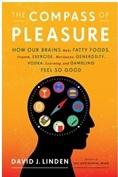Compass Of Pleasure': Why Some Things Feel So Good

Addiction Research Articles
Addiction Neurobiology Articles
Addiction Neuroscience Articles and News
Epigenetics
Overview
Originally Published: 06/23/2011
Post Date: 06/23/2011
by David Linden
Attachment Files
Addiction Neuroscience Article | Compass Of Pleasure': Why Some Things Feel So Good
Summary/Abstract
The Compass of Pleasure: How Our Brains Make Fatty Foods, Orgasm, Exercise, Marijuana, Generosity, Vodka, Learning, and Gambling Feel So Good
Content
What does it really mean for the brain to experience pleasure? That's the question neuroscientist David Linden asks in his new book The Compass of Pleasure: How Our Brains Make Fatty Foods, Orgasm, Exercise, Marijuana, Generosity, Vodka, Learning, and Gambling Feel So Good. In it, he traces the origins of pleasure in the human brain and how and why we become addicted to certain food, chemicals and behaviors. Linden is a professor of neuroscience at the Johns Hopkins University School of Medicine and the chief editor of the Journal of Neurophysiology. When he spoke with Fresh Air's Terry Gross, he explained that the scientific definition of addiction is actually rooted in the brain's inability to experience pleasure. "There are variants in genes that turn down the function of dopamine signaling within the pleasure circuit," Linden explains. For people who carry these gene variants, their muted dopamine systems lead to blunted pleasure circuits, which in turn affects their pleasure-seeking activities, he says. While most people are able to achieve a certain degree of pleasure with only moderate indulgence, those with blunted dopamine systems are driven to overdo it. Linden explains, "In order to get to that same set point of pleasure that others would get to easily — maybe with two drinks at the bar and a laugh with friends — you need six drinks at the bar to get the same thing." Any one of us could be an addict at any time. Addiction is not fundamentally a moral failing — it's not a disease of weak-willed losers. Understanding the biology of the pleasure circuit helps us better understand and treat addiction, Linden says. It is important to realize that our pleasure circuits are the result of a combination of genetics, stress and life experience, beginning as early as the womb. "Any one of us could be an addict at any time," Linden says. "Addiction is not fundamentally a moral failing — it's not a disease of weak-willed losers. When you look at the biology, the only model of addiction that makes sense is a disease-based model, and the only attitude towards addicts that makes sense is one of compassion."





